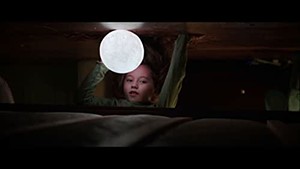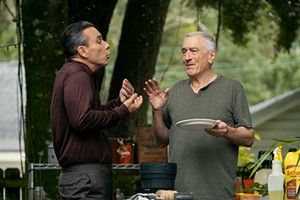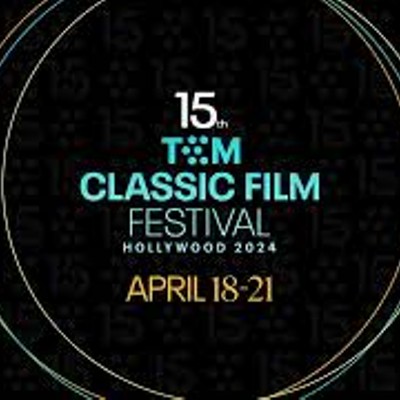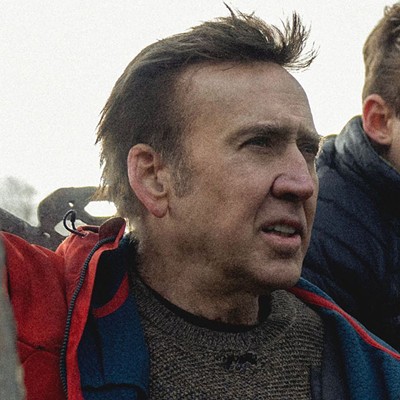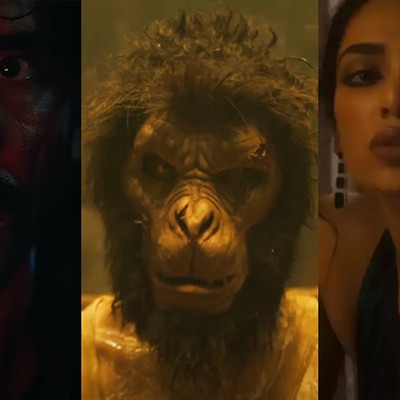Spider-Verse dazzles
Visually striking from beginning to
end, Spider-Man: Across the Spider-Verse is a truly incredible filmgoing
experience that renders its animated world(s) in the kind of minute detail and vibrant manner that forces you to redefine your expectations of the medium and genre. And the while the visuals are eye-popping, the narrative proves just as engaging, what with numerous existential crises (it IS a Spider-Man movie, after all) cropping up, each putting the various web-slinging characters through an emotional wringer.
For those of you out of the loop, the Spider-Verse is a multiverse in which thousands (millions?) of realities exist, each of them containing their own version of a spider-based hero. Long a staple in comic books, this concept was introduced on the big screen with 2018’s Spider-Man: Into the Spider-Verse, the first adventure of Earth 1610’s webhead, Miles Morales (voice by Shameik Moore). Much like Peter Parker, he too is struggling with the eternal juggling act of being a superhero, as well as a good student and dutiful son.
As if this isn’t enough, Miles’ world is turned upside down (literally, in one of the film’s most innovative moments) with the reappearance of Gwen Stacey (Hailee Steinfeld), the spider-hero of Earth-65. Over the course of the first entry, they became mutually smitten with one another and separation has made that spark burn brighter. Upon reentry to the Spider-Verse, Miles is told there is an elite strike force of spider-heroes, overseen by Miguel (Oscar Isaac), a fellow arachnoid-powered fella, who happens to be from the future. Their purpose is to prevent the spider-verse from being torn apart. Miles longs to be in the group, but it turns out that’s not to be, as a secret involving his origin makes him unique among his peers, his very existence an anomaly that threatens everything.
I was dubious upon seeing three directors listed. However, after seeing the finished product, one would think triple that number was needed to pull off this production in a timely manner. Every different world within the movie is rendered in a different artistic style, and as the locations switch, the viewer is plunged into one dazzling aesthetic after another. Some use traditional animated stylings, others are based on those of Spider-Man artists of the past (could have used more of the Steve Ditko world), and yet others use a more three-dimensional approach. There’s even a Lego-world at play. Hopefully, when the film is released on a home video format it will come with a list of annotations as to the allusions and Easter eggs as they are so numerous and pop up so quickly, it’s impossible to keep track of them all.
The highest praise I can give is that at two hours and 20 minutes, Spider-Verse did not wear out its welcome. For me, the concluding chapter of this trilogy can’t get here soon enough. In theaters.
Boogeyman familiar but effective
Related to the Stephen King story in only the most cursory manner, Rob Savage’s The Boogeyman is an effective, if familiar, thriller that manages to hit each expected note with the requisite punch needed to please genre fans. Reeling from the accidental death of his wife, therapist Will Harper (Chris Messina) is doing all he can to maintain a sense of normalcy for his daughters, Sadie and Sawyer (Sophie Thatcher and Vivien Lyra Blair, respectively). The trio goes through the motions, each contending everything is fine, denial dogging their every step. As if things couldn’t get any worse, Harper, whose practice is in his home, agrees to talk to a new patient, Lester Billings (David Dastmalchian), without properly screening him. After divulging his three children died under curious circumstances, deaths he was blamed for, he promptly commits suicide in an upstairs room.
Thus, Scott Beck, Bryan Woods and Mark Heyman have dispensed with two common tropes in their screenplay. With his death, Billings has released a supernatural entity that has plagued him and has conveniently done so in a house containing a vulnerable, fractured family. Lights Out (2016) and Come Play (2020) are two of the better recent examples of the family-in-peril subgenre of horror films, in which the absence of a parent leaves their children vulnerable to a supernatural threat. The monster in question is often a metaphor for unresolved feelings in the survivors or some familial secret.
In the end, The Boogeyman reveals itself to be an examination of not simply remorse, but survivor’s guilt. The Harpers’ inability to move on stems from fear of facing their grief, the trio refusing to discuss this, keeping their feelings in the dark. However, as with any monster, these issues can only be dealt with when brought into the light. In theaters.
De Niro is what Father’s all about
Running a brisk 89 minutes, director Laura Terruso’s About My Father wastes little time dispensing with the hefty amount of exposition in Sebastian Maniscalco and Austen Earl’s screenplay. We’re quickly filled in on the family history, Maniscalco recounting how his ancestors immigrated from Sicily to Chicago, and that like every Italian father, Salvo’s (De Niro) only purpose in life is to give his son more opportunities than he ever had.
Having established himself as a hairdresser with his own salon, the life he’s built for his family is one to be proud of. However, after recently losing his wife, Salvo is feeling vulnerable, something that’s exacerbated by Sebastian’s intention to propose to his longtime girlfriend, Ellie (Leslie Bibb).
Things come to a head when father and son are invited to the home of Ellie’s parents, a posh Virginia residence that reflects their one-percenter sensibility. The film kicks into high gear once this culture clash premise is introduced. When Salvo’s working-class hero isn’t mocking the entitled at every turn, he’s embarrassing his son with displays of his Italian pride and heritage, all of it done with a subtle touch of arrogance. Moments, such as an agonizing sequence in a posh country club in which he insists on paying for his and Sebastian’s dinner, despite their hosts, Ellie’s parents Bill and Tigger (David Rasche and Kim Cattrall) insisting they’ll treat, work because of the grain of truth they contain.
Some of the bits – a ham-fisted allusion to Goodfellas, Salvo’s making of an “authentic” Italian meal – are too obvious to work, while Ellie’s brothers, Lucky and Doug (Anders Holm and Brett Dier), are so over-the-top, their appearances prove more irritating than comic. However, De Niro dominates in each scene he’s in, employing a far more subtle, humane touch here than in the previous comedies he’s tackled. Though its moments of slapstick and broad humor are being used to promote it, it’s the heart the veteran actor brings to his character that makes Father a slightly above average time-filler. In theaters.

